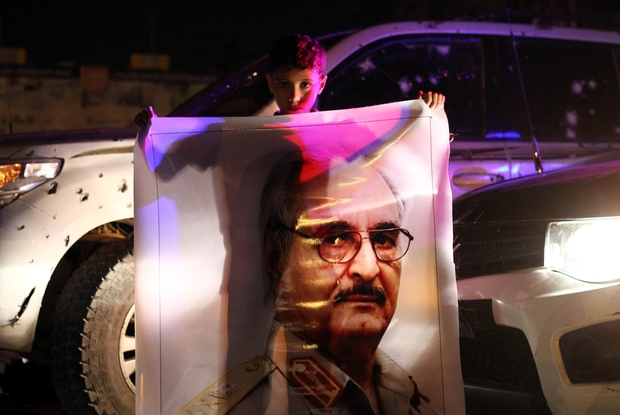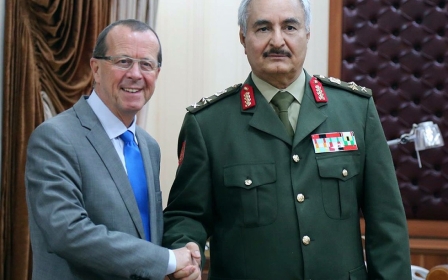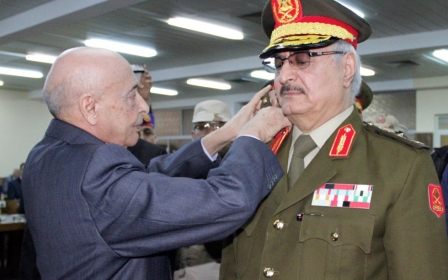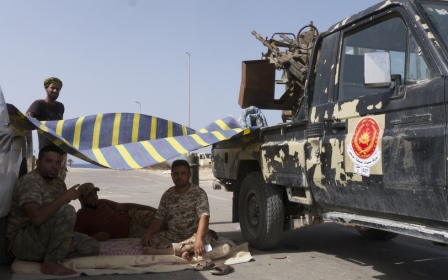REVEALED: Leaked tapes expose Western support for renegade Libyan general

A multinational military operation involving British, French and US forces is coordinating air strikes in support of a renegade general battling Islamist militia groups from a base near Benghazi in eastern Libya, air traffic recordings obtained by Middle East Eye reveal.
The leaked tapes appear to confirm earlier reports suggesting the existence of an international operations centre that is helping General Khalifa Haftar in his campaign to gain control of eastern Libya from groups he has declared to be “extremists”.
At least one air strike was heard being coordinated in the tapes, which total just under an hour in length, suggesting the operations room is being used not only for reconnaissance.
The recordings were passed to MEE from the Benina air base, which is considered to be Haftar’s most important military facility.
The leaks could prove damaging for the international parties involved because Haftar has refused to support the UN-backed unity government in Tripoli and has been fighting some groups that have taken part in the Western-backed campaign against the Islamic State (IS) group.
Last month, the UN Security Council authorised an EU naval force to enforce the arms embargo on Libya by intercepting ships suspected of carrying weapons. The arms embargo was imposed on Libya in 2011, but UN sanctions monitors have reported shipments from Egypt, Turkey, the United Arab Emirates and Sudan to various factions.
One of those factions is led by Haftar, against whom the EU has previously threatened to extend sanctions for undermining the UN-backed Libyan government.
"The sanctions are meaningless,” Haftar’s spokesman said at the time of the threat. “At the moment we have only heard reports in the media and have had no formal message.”
Middle East Eye also revealed in March that British SAS soldiers, supported by Jordanian forces, were already operating in Libya against IS militants.
The leaked tapes feature pilots and air traffic controllers speaking in Arabic and English. British, American, French and Italian accents can be heard.
“Benghazi, good morning, Ascot 9908,” a man with a British accent is heard saying. “Ascot 9908, just letting you know we are in contact with Benghazi airfield.”
The call sign Ascot 9908 came up repeatedly in the recordings. Later on, the man was heard saying: “Ascot 9908 with you again from Benina, we’re looking to pick up a flight plan route from Lima Golf Sierra Alpha.”
“That’s Ascot 9908, we are complete at Benina and next destination is Lima Golf Sierra Alpha,” the same man said, before ending the conversation and continuing with his mission.
Those speaking with French and Italian accents seemed to spend most of the recordings directing air traffic from the control room.
Pilots with American accents also featured prominently. Their two key call signs were Bronco 71 and Mustang 99 - the names of classic American cars.
Many of the files sound like routine air traffic control room communications – numbers, call signs, complaints about malfunctioning radios and back-and-forth confirmations.
“Sorry about the trouble, sir, our radios are not working well,” a voice, presumed to be an American pilot, said. “Control, Mustang 99 is departing your airspace to the northeast, apologies once again for our radios and good evening.”
The Fish Market
A number of voices were also heard on the leaked files speaking in Arabic.
“The first target has been interacted with,” an Arabic-speaking pilot is heard saying. The target was in Souq al-Hout, or the Fish Market.
“It’s a famous neighbourhood in Benghazi,” said Libya specialist Mattia Toaldo, a senior policy fellow at the European Council on Foreign Relations.
“It’s one of the neighbourhoods close to the sea. It was crucial during the 2011 fighting (against former leader Muammar Gaddafi) and then it’s been one of the main areas of fighting between Haftar and the Islamist forces since 2014.”

The group Haftar is fighting in Souq al-Hout is called the Shura Council of Benghazi Revolutionaries (SCBR), an amalgamation of several Islamist and militant groups.
The group’s make-up is complicated and contradictory but crucially the SCBR does not include or align itself with IS.
The coalition includes Ansar al-Sharia, which is labeled a terrorist organisation by the UN, the US, the UK and Turkey. But it also includes the February 17th Martyrs Brigade, which is not considered a terrorist organisation and is reportedly funded by the Libyan defence ministry in Tripoli.
“We have interacted with the second target, and we’re going on to the third target, God willing,” the Arabic speaking pilot is heard saying as he flew over Souq al-Hout.
Air traffic control then responds and urges him to "go ahead".
“We have interacted with the third target,” the pilot says.
At another point in the leaked tapes, an air-traffic controller admonishes an Arabic-speaking pilot for unloading one of his two bombs early. Later, a pilot asks the operations room to check if one of his bombs had exploded.
'He doesn’t want any rivals'
That the groups Haftar is targeting are not IS, nor even IS-aligned, is noteworthy but not new considering his actions in Derna, a town east of Benghazi.
Haftar was a key military figure in Gaddafi's army, but was exiled to the US and returned during the 2011 revolution to try to oust the long-time leader. He has been accused of having links to the CIA, of having presidential ambitions and, according to the Economist, is "often considered a spoiler of efforts to unify the country".
His role in any national military force, as minister of defence or an army commander, has been one of the most contentious issues in attempts to achieve unity.
Western support has only emboldened the renegade general to the detriment of attempts to unify the chaotic North African country, Toaldo told MEE.
“Support by Western special forces, particularly French, to General Haftar has made it more difficult to reach a compromise with him because he thinks he has important external backing and therefore does not need to compromise with the unity government,” he said.
Two years ago, Haftar launched Operation Dignity, centred primarily around Benghazi. He subsequently allied with the eastern Tobruk-based government, but despite his claims to have "liberated" Benghazi earlier in 2016, violence has continued to rage. On Thursday, a car bomb killed 12 of Haftar's fighters.
Just as IS has exploited the chaotic situation to bolster its presence inside Libya – turning Gaddafi’s home city Sirte into a training camp for its militants - Haftar appears to have exploited IS to secure foreign backing.
Foreign backing for Haftar
Since Operation Dignity was launched, there have been numerous reports that he receives support from foreign powers, notably Egypt and the UAE, which are thought to be responsible for night-time air strikes on sites controlled by Islamist-aligned forces.
In a 20-minute interview with the BBC, Haftar acknowledged that his forces had received support from foreign powers.
“IS in Benghazi had a hard time in the past few months, but we should not take the lesson that we should support Haftar,” Toaldo said. “It’s mostly because of the external support that Haftar forces got that IS in Benghazi have had a hard time, but on the other hand it’s because of the split between IS and the Benghazi revolutionary council.”
This time last year, IS was decimated in the eastern coastal city of Derna by the Shura Council of Mujahideen in Derna, another Islamist group.
While the UN-backed government has been busy trying to clear IS out of their Libyan stronghold of Sirte in recent months, Haftar has been fighting his own war – against the same group that pushed IS out of Derna.
The UN Support Mission in Libya condemned Haftar's airstrikes on Derna and warned that the resulting civilian casualties may constitute a war crime.
“It’s not new in its strategy because basically he doesn’t want to have any rivals in the east and he considers everyone, even loosely associated with political Islam, as terrorists,” Toaldo said. “Much like his Egyptian patrons.”
Speaking about the long-term consequences of the leak, Toaldo said: “I think that it changes things more in Europe than in Libya because it’s more difficult for the French government to deny any involvement in Benghazi.
“It will have to explain why it’s supporting the unity government with a lot of diplomatic effort, while its military forces are supporting the rival of that government.”
A British Ministry of Defence spokesman said: “As we have said before, the RAF regularly facilitates visits by diplomatic and military advisers to Libya.”
The MoD also said that it does not comment on leaked documents or offer running commentary on flights for security reasons and has not conducted air strikes over Libya.
The French Ministry of Defence declined to comment.
This article is available in French on Middle East Eye French edition.
Middle East Eye propose une couverture et une analyse indépendantes et incomparables du Moyen-Orient, de l’Afrique du Nord et d’autres régions du monde. Pour en savoir plus sur la reprise de ce contenu et les frais qui s’appliquent, veuillez remplir ce formulaire [en anglais]. Pour en savoir plus sur MEE, cliquez ici [en anglais].




